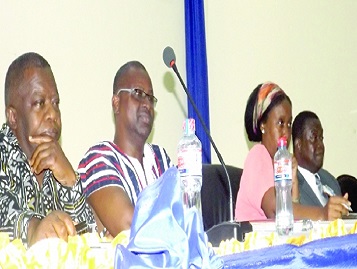A lecturer at the University of Ghana, Dr Aaron Abuosi, has described the country’s electronic health (e-health) policy as not reflecting the needs of the people for whom it was developed.
He said the policy’s approach in harnessing Information Communication Technologies (ICTs) seemed to be more about technocrats breathing down the necks of Ghanaians what they thought was the way to go, rather than Ghanaians themselves as ultimate beneficiaries, owning and dictating the pace of the policy.
Dr Abuosi gave the evaluation when he took his turn at the first symposium of the 67th Annual New Year School.
The symposium was on the theme, “Evaluating Ghana’s E-Health policy.”
Presentations
Dr Abuosi explained how developments in the use of ICTs in the country had not been matched by an enabling environment to harness the gains and maximise them for the health sector.
According to him, an established enabling environment for harnessing ICTs was the ideal situation for any country to attain international standards in the use of ICTs in health service provision.
He said Ghana had a good ICT infrastructure with telecommunications coverage that was nation-wide.
That, according to Dr Abuosi, was a plus for the country’s e-health policy, making it one of the few leading countries in ICTs on the continent.
What was lacking, however, was strategic and coherent policies to harness such opportunities.
He said the country had to strengthen its enabling environment for e-health by getting down to the people and sensitising them on what needed to be done to scale up the use of technologies which were already familiar to them.
Success
The director of research systems and information management at the Ministry of Health, Dr Isaac Adams, said in spite of some challenges relating to funding, the e-health policy had chalked up some successes.
He said as at the close of last year, the country had 15 e-health initiatives based on the application of mobile telephony.
Dr Adams cited initiatives in the Northern Region where in areas such as the Bongo District, information was sent to pregnant women through Short Messaging Services (SMS), thereby reducing maternal mortality.
He said during the cholera outbreak last year, the Keta District recorded no deaths because of the setting up of call centres that provided immediate responses to queries on the disease.
According to Dr Adams, confidence in health delivery in some communities had also increased because of the use of mobile telephony to directly reach out to doctors.
Concerns
Some of the participants raised concerns about how well Ghanaians would accept an ICT mediated medical examination and the role of mobile telephony companies in the e-health policy.
The Vice Dean of the School of Graduate studies of the University of Ghana, Prof. Ama de Graft-Aikins, who chaired the session was, however, confident that the people would readily accept the use of
ICT in health service provision to reduce the stress of travelling distances to hospitals and health centres to wait for long hours for consultations.
Credit: Graphic






